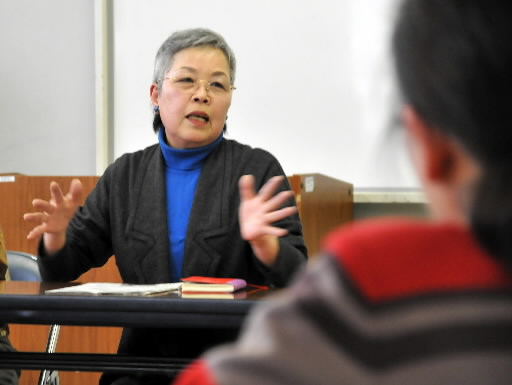Nuclear Weapons Can Be Eliminated: Chapter 9, Part 1
Apr. 15, 2010
Chapter 9: Messengers from Hiroshima
Part 1: Hiroko Menda
by Junichiro Hayashi, Staff Writer
About 2,000 people from Japan, including roughly 100 from Hiroshima, among them A-bomb survivors (hibakusha), will head to the United States in time for the Nuclear Non-proliferation Treaty (NPT) Review Conference to be held at U.N. headquarters in New York from May 3-28. They will visit the United States to appeal for the necessity of eliminating nuclear weapons. The Chugoku Shimbun will track their hopes and resolve with regard to the NPT Review Conference as well as the feelings of those who cannot visit the United States due to advanced age or poor health.
"I lost my mother and father because of that war, though we did nothing wrong…" In late March at the Ushita Community Center in Higashi Ward, Hiroshima, Hiroko Menda, 70, an A-bomb survivor and a Hiroshima resident, began to share her account of the bombing with 22 housewives and children.
Ms. Menda will join the delegation of the Hiroshima Council against Atomic and Hydrogen Bombs and travel to the United States in May in conjunction with the NPT Review Conference. "Nuclear weapons and war, which turn children into orphans, are immoral," she said. "I think I have a responsibility to speak out about my experience."
Ms. Menda saw the flash of the atomic bomb from her home, located about four kilometers from the hypocenter. She was exposed to the "black rain," which was sticky like coal tar. Her mother, prone to illness, passed away soon after the bombing, leaving behind four children, including Ms. Menda, who was just five years old at the time, and Ms. Menda's older sister, older brother, and younger sister. Ms. Menda's father died during the war while in the Philippines.
After graduating from junior high school, Ms. Menda relied on distant relatives who ran a restaurant in the city of Kure. She worked for the restaurant as a live-in helper while attending a night program to complete high school. "I felt bitter about the war, which had stolen my parents from me," she recalled. "At the same time, as Japan became a democratic country, I started to forgive."
She worked diligently, delivering milk and cooking for a food service. She married and was blessed with two children. However, when her children fell ill, she was plagued with worry, wondering if the cause could be linked to radiation from the atomic bomb.
At the age of 35 she obtained the Atomic Bomb Survivor's Certificate. "I didn't want my daughters to be considered second-generation A-bomb survivors. But I thought that the certificate would serve as evidence when I argued that the atomic bombing was wrong."
In 1990, Ms. Menda took part in a conference for International Women's Day at the U.N. European Headquarters in Geneva. The themes of the conference were nuclear weapons, nuclear tests, and the effects of radiation on human health. Ms. Menda spoke out about the damage caused by the atomic bombing.
However, she felt on a different wavelength from the other participants. "I was talking about how much anguish that one bomb caused," she said, "but the subject of the conference was the reduction of thousands of nuclear weapons. They weren't discussing the eradication of all the weapons." She sensed a "wall" blocking others' understanding of Hiroshima.
Now, she thinks: "The atomic bombings of Hiroshima and Nagasaki were tragedies that befell human beings. If we don't see the atomic bombings in such terms, nuclear abolition will not be considered a matter of course. Nuclear weapons still hang, as if in clusters, over the heads of humanity."
Ms. Menda will take part in a demonstration march in New York just prior to the opening of the NPT Review Conference and will convey her A-bomb experience as much as she can. "I want to use this visit as an opportunity to secure a future without nuclear weapons," she said. "I may have little power, but I can't keep silent." The determination she feels showed clearly in her eyes.
Keywords
Nuclear Non-proliferation Treaty (NPT)
The Nuclear Non-proliferation Treaty (NPT) entered into force in 1970 and was indefinitely extended in 1995. About 190 nations are member states of the NPT. The NPT limits nuclear weapon states to the United States, Russia, the United Kingdom, France, and China, imposing on these nations the obligation to hold negotiations for nuclear disarmament. The treaty grants non-nuclear weapon states the right to the peaceful use of nuclear energy and prohibits producing or acquiring nuclear weapons. The de-facto nuclear weapon states of Israel, India, and Pakistan are not signatories of the NPT. North Korea declared its withdrawal from the treaty in 2003. The NPT Review Conference, in which execution of the treaty is checked, is convened every five years.
(Originally published on April 13, 2010)
To comment on this article, please click the link below. Comments will be moderated and posted in a timely fashion. Comments may also appear in the Chugoku Shimbun newspaper.








